As a business, once you start with something, it becomes almost impossible to retrace your steps and retrospect on your choices or alter the decisions that you took in the past - especially if one little move holds the capacity to affect both you and your audience exponentially. Hence, optimum planning is necessary for each aspect that your organisation is working towards, including web development for your online presence.
To keep pace with the digital world, more and more businesses are showing up online to grab more eyeballs and solidify their market value. A facilitator in this process is Drupal 9 - and a quite popular one at that owing to its flexibility and scalability. Drupal 9 presently is in use across several industry verticals and powers thousands of websites.
While there’s a lot that goes into the general process of web development, simplifying the process by placing all your thoughts methodically is always possible. This list is intended to serve both as an exhaustive guide and as a checklist representing the correct chronology in which web development needs to be approached.
Defining the Purpose
The very reason that you’re getting into web development is because you have a purpose in your mind, but what’s essential is to define that purpose. This is required both for your future team and for your audience to understand and resonate with your brand better. Your target audience along with your unique value proposition must be clearly outlined along with your short term and long term goals, including both value addition and business targets. The defined goals should be measurable, relevant to your business value, time bound, and lastly, be attainable in the time allocated. While planning the execution, defining ways to measure the success of each campaign is also equally important.
A blueprint will only help you proceed with web development in a defined, synchronised manner - essential for managing future growth and expansion.
Picking the right team
After defining the purpose, the next step in web development planning would be to pick a team that brings these targets to a tangible completion. Depending on your business, the team would vary in terms of manpower and skillset. If your business focuses on UX (User Experience), you would want to have designers on board. If it focuses on sales of a product or a service, more marketers would be required. Nevertheless, the team that you tentatively need would comprise
- a project manager for keeping things on the track,
- content creators to provide written and other media content,
- a content strategist/architect to plan priorities organise the site,
- Designers to plan and design the layout,
- Developers - both frontend and backend.
Refer to all the different roles and skills integral to building a Drupal 9 website here. And, for the decoupled Drupal project, you can check out all the right skills here.
Building a Brand Image
Once two and two are together, the first thing that you and your team needs to do is to plan out a brand image as this will be the bedrock to the web development process of all your website content, marketing strategies and social media presence. Some important elements to decide on would be -
- The logo, as this is what most people would associate your brand to. The layout, colour palette and design of the logo should represent the underlying identity of your business.
- The domain name, essential for brand identity as well as driving traffic to your website. It must be short and easy to pronounce.
- Also keep in mind that the advertised USP (Unique Selling Proposition) must also be in line with the brand image, as anything that reaches out to the audience more often is a matter of greater scrutiny.
Planning it out
Now is the time to analyse every nook and corner of the web for competitor research. Ideally, there should be a list of brands that you both consider a competitor but also look up to, preferably businesses operating in the same domain with a similar target audience. Another area of analysis should be the current market standing of the kind of products and services that you’re offering. What are you audience looking for in the present scenario? What is the gap that your product is intending to fulfill?
Here’s what the mind map for your research should look like -
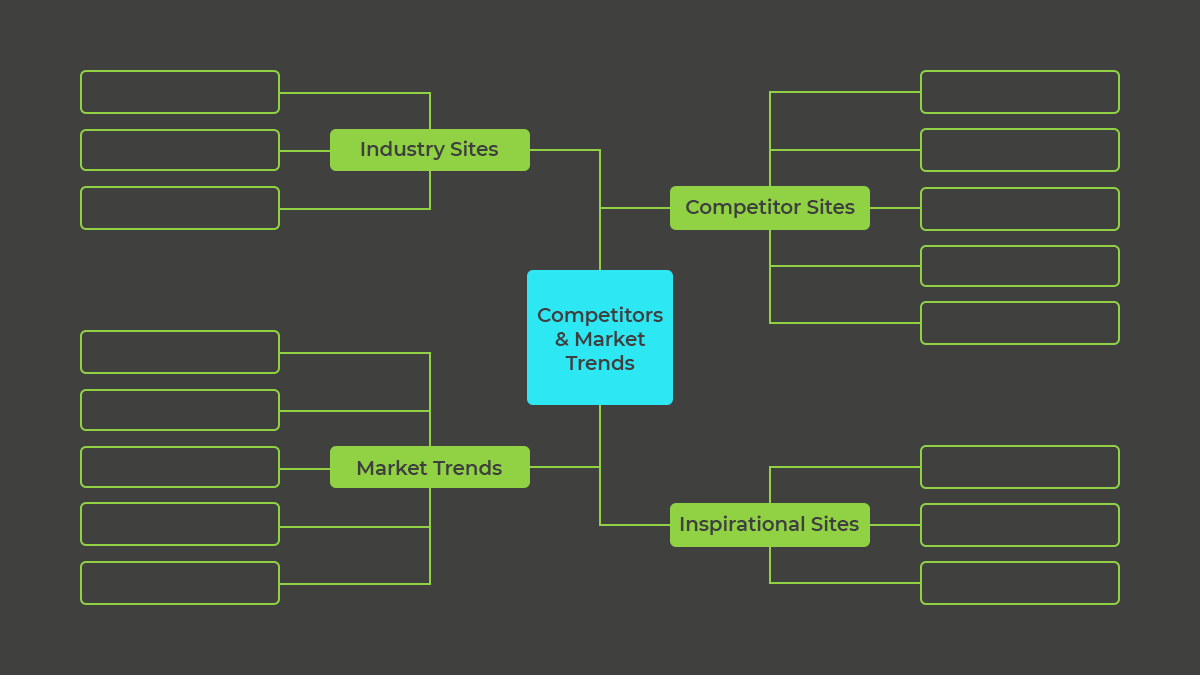
Post research, comes the actual planning of the website's elements, which will be -
- The website’s structure. A sitemap can be used for facilitating the layout.
- Identifying the interests and navigation trends of your audience by deploying relevant tools to do the job, and creation of a users’ persona for better understanding of the market needs. A flowchart software can be of great help in this case, as it lays out the navigation in this manner -
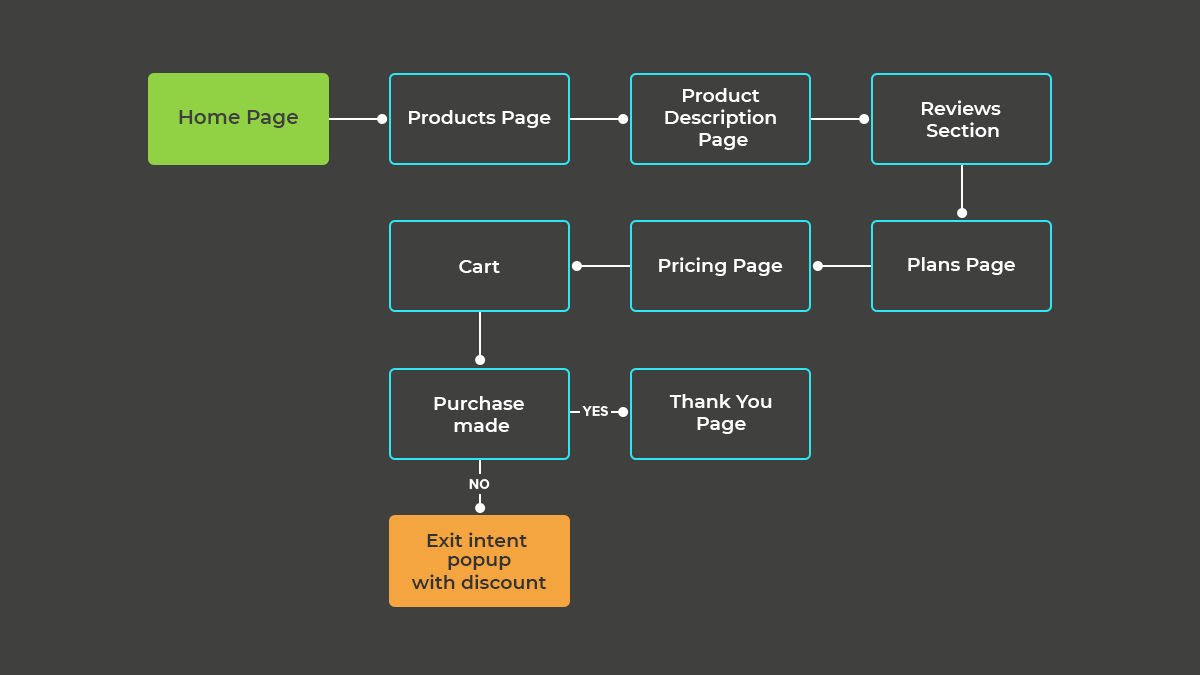
- Budgeting. Allocation of money, or a draft blueprint of the same needs to be created.
The layout
For the web development process regarding the website’s layout, elements under consideration should be -
- Deciding on the colour palette, the font, photography style, spacing - basically everything that your audience interacts on a daily basis with, that could be a potential bottleneck later on if left undecided.
- Use of wireframes to preview your website’s layout. A wireframe is exactly what it sounds like - the skeleton of the layout like page contents and their placement without added elements of color and design, for an understanding of the site’s functionality.
- Quality design is invaluable, as elements in your layout can comprise your USP as well. The layout should be attractive and convenient enough to navigate for your user to want to come back.
The importance of UX
If a website is too complicated, has lousy speed, has a scattered icon placement or the content isn’t comprehensible, even having a good service delivery will not help. The design of a website holds the capacity to create a bond of trust with the user, and also to establish customer loyalty. Areas of focus should be
- Use of simple, lucid language.
- The content should put across the point instantly without beating around the bush.
- A well thought out design that visualises the effort that has been put into it.
- A list of FAQs (Frequently Asked Questions) makes knowledge sharing about your service even easier.
- Multiple device compatibility
- Interactive, responsive UI (User Interface)
The overall look and feel of the website must be professional and should have an elegant touch in the present elements. If a user is by chance tickled off by the design or performance of the website or if he can’t find what he’s looking for, retaining him would not be possible. Read our comprehensive guide to web design to know more.
Choosing the right CMS
A good amount of work is already done just by choosing a good CMS (Content Management System). Some large enterprises are based on CMSes like Drupal and rely on the softwares for their digital infrastructure due to the inbuilt tools and stability that comes with it, excluding the need for being extremely tech savvy. Depending on the amount of features and flexibility that is required by your business, Drupal can be your best bet.
Certain points to keep in mind after deciding to start your web development project with Drupal -
- Keep up with the frequent updates that the software goes through. It might seem like a simple, matter-of-fact thing to do right now, but if you are not mindful of planning it ahead, you can miss out on many new features and benefits offered by Drupal by lagging in the update cycle. It is, hence, recommended to schedule reminders ahead of time.
- The architecture of the website needs to be revisited from time to time. Is there any deprecated code that needs to be removed? Or, have your priorities changed over time, and you require different features than the ones already existing? It is imperative that these questions be answered time and again.
Drupal 9, the latest version of Drupal, is always a good option to go for because of the widespread community support and global usage it comes with. With a variety of packages and distributions, web development in Drupal 9 becomes pretty simple even for new developers as there are multiple tools to their aid - the best part being that there’s something for everyone. Updating Drupal is even simpler, a single click upgrading every theme and module on the site.
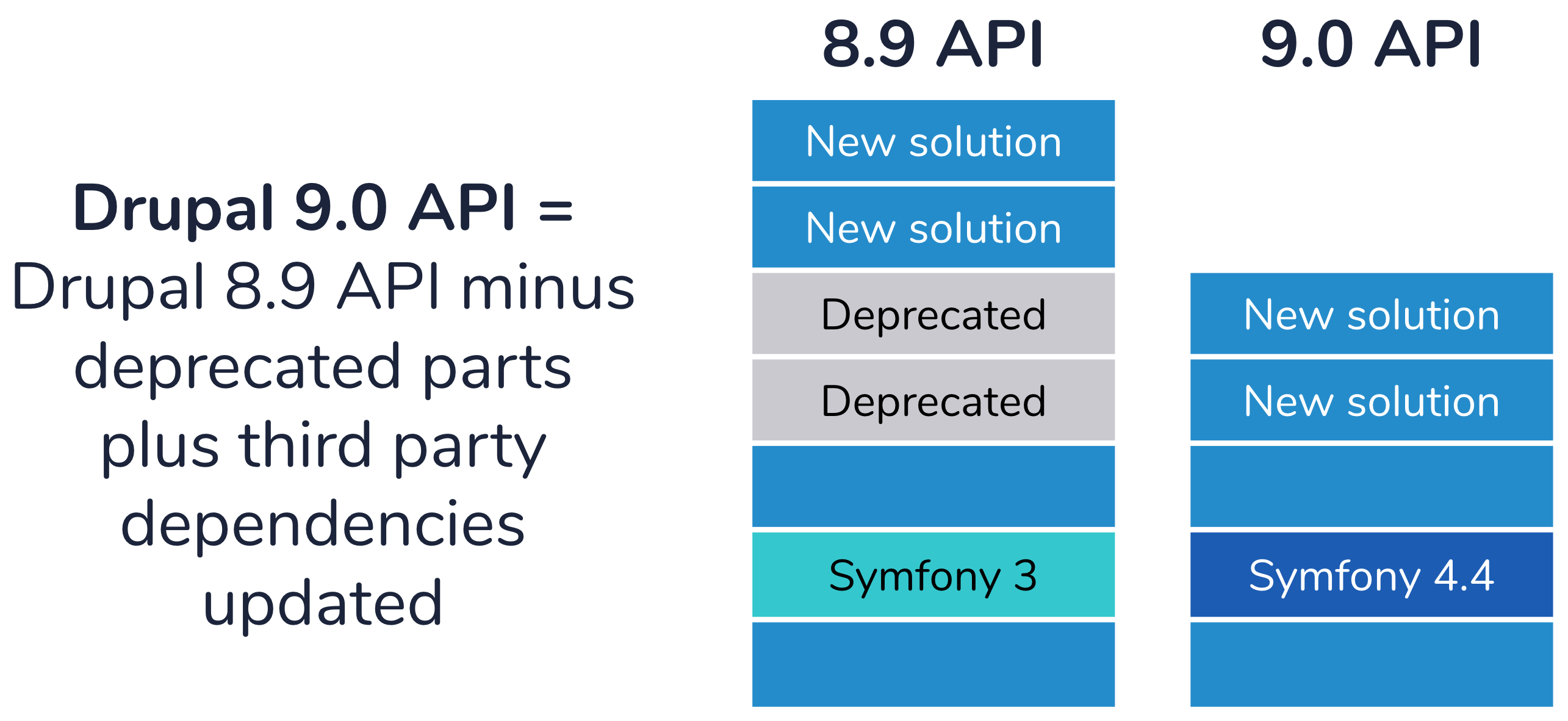
The correct choice of modules can greatly amplify one’s experience when it comes to web development in Drupal 9. A great choice to make the page layout more methodical would be the Admin Toolbar module, as it makes the admin toolbar into a drop down menu. A simple XML sitemap module increases the efficiency of SEO by creating multiple multilingual sitemaps along with custom URLs, and a Coffee module greatly enhances the UX by allowing the user to navigate to the admin seamlessly just by using a keyboard shortcut.
To know about the complete list of essential Drupal modules that will help in kick starting your web development project with Drupal 9, read this blog. Access our complete guide to Drupal 9 and go through Drupal 9 FAQs to know more.
Marketing it right
First, a decision needs to be taken on what avenues would be used for advertising and also how these channels will be prioritised, according to the underlying research about one's target audience. Is social media your primary channel to reach your audience? if yes, then which platform fits best with your business model? All these questions need to be answered before hitting the market. Some valuable points to keep in mind are -
- Search Engine Optimization of all the content on your website is essential to drive more traffic into your website.
- The URL structure should be logical and also optimised.
- Meta description is what a person reads before clicking on the website link, and it should be viewed as an interactive opportunity for a business to make a good first impression.
- Targeted marketing like cold emails and DMs might also work for some businesses.
- The content strategy should be end to end, which schedules in line for planning, creating, executing and measuring it.
Brainstorming sessions with your team about new marketing strategies and ideas are also a good marketing execution method.
Choosing the right agency partner
Taking expert aid can never hurt. Instances where the work gets too bulky or complicated for you, it is best to delegate it to an agency that knows the job inside out owing to years of experience and varied resources suited to different purposes.
- An agency not only does your work in a much better and professional fashion, but also acts as a consultancy for any queries that you might have.
- Technology is fast evolving, hence, it is best to have a safety net that fills in the gaps in expertise wherever required.
- Your development gains maximum momentum with an additional number of hands working towards a specific goal with a focused intent, hence catalysing the development process.
- Strategising, design and development are all areas that can gain significantly from an outsider’s perspective.
If you sync well with your agency partner and are able to make it long-term, a professional advisory would always be at a close proximity. Hence, it is an investment disguised as a partnership. An agency can help you migrate a bulk of content or develop a new website from scratch with ease - using their seasoned knowledge. Often, agencies also provide you post production support and maintenance. If your functional CMS is Drupal and you are unsure about how to incorporate the latest Drupal upgrade, or if you’re a business just setting up their Drupal website, you can well utilise the services of certified Drupal experts at OpenSenseLabs. Or, if you wish to extend your team of Drupal developers, UI/UX strategists and JavaScript developers, our unique staff augmentation model is available for flexible contracts with dynamic availability of certified professionals.
Future Plans
Lastly, everything might be moving on track for now, but that won’t be the case forever. Pre plan safety nets for all possible ups and downs. Also, it is important to not lose track of your long term goals by getting too engulfed in the day to day functioning of the website. A little farsightedness goes a long way.
Subscribe
Related Blogs
Drupal Debug: Effective Techniques And Tools

Today, we will discuss how to do Drupal Debug. This means getting the tools and methods to turn complex issues into workable…
Drupal SDC v/s Storybook: What’s The Difference?
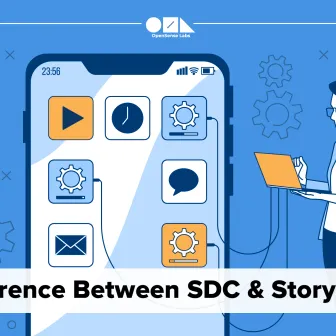
One helps you set up your UI components, and the other allows you to work with them. we are exploring Single Directory…
Starshot: Drupal’s New CMS Initiative
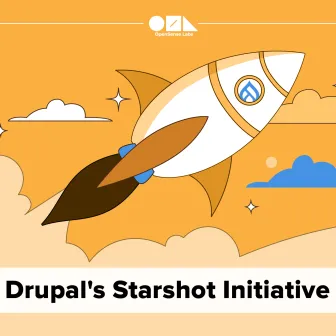
The Drupal community is excited about the Drupal Starshot project, which aims to update and improve the Drupal experience…



